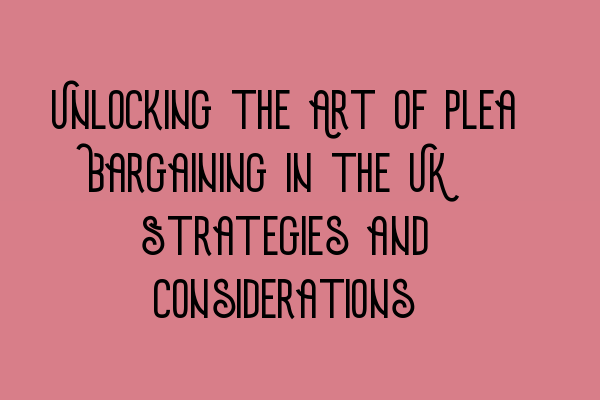Unlocking the Art of Plea Bargaining in the UK: Strategies and Considerations
Welcome to SQE Criminal Law & Practice Law UK, your trusted source for expert advice on criminal law matters in the United Kingdom. In this blog post, we will explore the art of plea bargaining in the UK and discuss the strategies and considerations involved. If you are facing criminal charges or are involved in a legal proceeding, understanding the concept of plea bargaining can be crucial to your case.
What is Plea Bargaining?
Plea bargaining is a negotiation process between the prosecution and the defense, where the defendant agrees to plead guilty to a reduced charge or to certain charges being dropped in exchange for a more lenient sentence or other concessions. The main objective of plea bargaining is to resolve criminal cases efficiently and avoid lengthy trials.
Strategies for Successful Plea Bargaining
When engaging in plea bargaining, it is essential to have a solid strategy in place. Here are some strategies that can help you achieve a successful plea bargain:
- Thorough Case Evaluation: Before entering into plea negotiations, it is crucial to thoroughly evaluate your case. Understanding the strength and weaknesses of the prosecution’s evidence can help you negotiate from a position of strength.
- Effective Communication: Open and effective communication with your legal team is key. Clearly express your goals and concerns, and work together to develop a negotiation strategy that aligns with your objectives.
- Understanding Prosecution’s Perspective: It is important to understand the prosecution’s viewpoint and what they may be willing to offer in a plea deal. Researching similar cases and past outcomes can provide valuable insight.
- Offering Something of Value: In order to secure a better plea deal, it may be necessary to offer something of value in return. This could include providing useful information, agreeing to cooperate as a witness, or participating in rehabilitation programs.
Considerations in Plea Bargaining
While plea bargaining can be advantageous, there are several factors to consider before making a decision:
- Strength of Prosecution’s Case: Evaluating the strength of the prosecution’s case is crucial. If the evidence against you is weak, it may be more beneficial to proceed to trial.
- Potential Sentencing: Understanding the potential sentencing outcomes for both the original charges and the proposed plea bargain is essential. Assess if the proposed plea deal provides a significant reduction in potential penalties.
- Collateral Consequences: Plea bargains may have collateral consequences, such as immigration implications, professional licensing issues, or reputational damage. It is important to assess and weigh these potential consequences.
Related Articles:
- Legal Representation for Delaware LLCs in the UK: Expert Advice
- Ensuring Ethical Business Practices: Delaware’s Code of Conduct
- Legal Challenges for UK Businesses in the U.S.: Strategies for Overcoming Hurdles
- UK Criminal Law: An In-Depth Analysis of the British Legal System
- Legal Challenges for UK Businesses in the U.S.: Strategies for Overcoming Hurdles
At SQE Criminal Law & Practice Law UK, we understand the complexities of criminal law and the importance of effective plea bargaining. Our experienced solicitors are ready to provide expert legal representation and guide you through the process. Contact us today for a consultation and let us help you navigate the path to a successful outcome.
